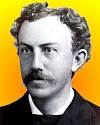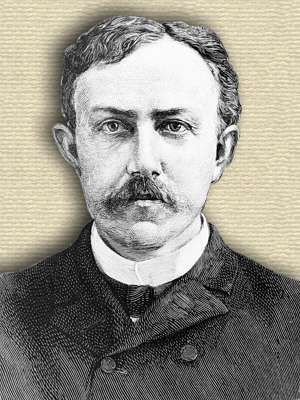 (source)
(source)
|
David Starr Jordan
(19 Jan 1851 - 19 Sep 1931)
American ichthyologist and peace activist who was foremost in his field in America in his time, and was expert in other fields. He testified at the Scopes Monkey Trial supporting evolution.
|
Science Quotes by David Starr Jordan (5 quotes)
All war is murder, robbery, trickery, and no nation ever escaped losses of men, prosperity and virility. War knows no victor.
— David Starr Jordan
From his last public address in Palo Alto, California (30 July 1928), as quoted in 'David Starr Jordan Dies at Age of 80', New York Times (20 Sep 1931), N6.
It is one of the laws of life that each acquisition has its cost. No organism can exercise power without yielding up part of its substance. The physiological law of Transfer of Energy is the basis of human success and happiness. There is no action without expenditure of energy and if energy be not expended the power to generate it is lost. This law shows itself in a thousand ways in the life of man. The arm which is not used becomes palsied. The wealth which comes by chance weakens and destroys. The good which is unused turns to evil. The charity which asks no effort cannot relieve the misery she creates.
— David Starr Jordan
In The Strength of Being Clean: A Study of the Quest for Unearned Happiness (1900), 6.
Our country is now at war and the only way out is forward. I would not change one word I have spoken against war but that is no longer the issue. We must now stand together.
— David Starr Jordan
As quoted in 'David Starr Jordan Dies at Age of 80', New York Times (20 Sep 1931), N6.
The process of natural selection has been summed up in the phrase “survival of the fittest.” This, however, tells only part of the story. “Survival of the existing” in many cases covers more of the truth. For in hosts of cases the survival of characters rests not on any special usefulness or fitness, but on the fact that individuals possessing these characters have inhabited or invaded a certain area. The principle of utility explains survivals among competing structures. It rarely accounts for qualities associated with geographic distribution.
The nature of animals which first colonize a district must determine what the future fauna will be. From their specific characters, which are neither useful nor harmful, will be derived for the most part the specific characters of their successors.
It is not essential to the meadow lark that he should have a black blotch on the breast or the outer tail-feather white. Yet all meadow larks have these characters just as all shore larks have the tiny plume behind the ear. Those characters of the parent stock, which may be harmful in the new relations, will be eliminated by natural selection. Those especially helpful will be intensified and modified, but the great body of characters, the marks by which we know the species, will be neither helpful nor hurtful. These will be meaningless streaks and spots, variations in size of parts, peculiar relations of scales or hair or feathers, little matters which can neither help nor hurt, but which have all the persistence heredity can give.
The nature of animals which first colonize a district must determine what the future fauna will be. From their specific characters, which are neither useful nor harmful, will be derived for the most part the specific characters of their successors.
It is not essential to the meadow lark that he should have a black blotch on the breast or the outer tail-feather white. Yet all meadow larks have these characters just as all shore larks have the tiny plume behind the ear. Those characters of the parent stock, which may be harmful in the new relations, will be eliminated by natural selection. Those especially helpful will be intensified and modified, but the great body of characters, the marks by which we know the species, will be neither helpful nor hurtful. These will be meaningless streaks and spots, variations in size of parts, peculiar relations of scales or hair or feathers, little matters which can neither help nor hurt, but which have all the persistence heredity can give.
— David Starr Jordan
Foot-notes to Evolution. A Series of Popular Addresses on the Evolution of Life (1898), 218.
Wisdom is knowing what to do next, skill is knowing how to do it, and virtue is doing it.
— David Starr Jordan
In 'American University Tendencies' (23 Mar 1903), Address at the Charter Day exercise to University of California, stenographic report in University Chronicle (1903), 6, 5.
See also:
- 19 Jan - short biography, births, deaths and events on date of Jordan's birth.
- More for David Starr Jordan on Today in Science History page.
- Click for The Eccentric Naturalist - sketch of Constantine Rafinesque by David Starr Jordan (1885)
- Shore Fishes of Hawaii, by David Starr Jordan and Barton Warren Evermann. - book suggestion.
- Booklist for David Starr Jordan.

 In science it often happens that scientists say, 'You know that's a really good argument; my position is mistaken,' and then they would actually change their minds and you never hear that old view from them again. They really do it. It doesn't happen as often as it should, because scientists are human and change is sometimes painful. But it happens every day. I cannot recall the last time something like that happened in politics or religion.
(1987) --
In science it often happens that scientists say, 'You know that's a really good argument; my position is mistaken,' and then they would actually change their minds and you never hear that old view from them again. They really do it. It doesn't happen as often as it should, because scientists are human and change is sometimes painful. But it happens every day. I cannot recall the last time something like that happened in politics or religion.
(1987) -- 


